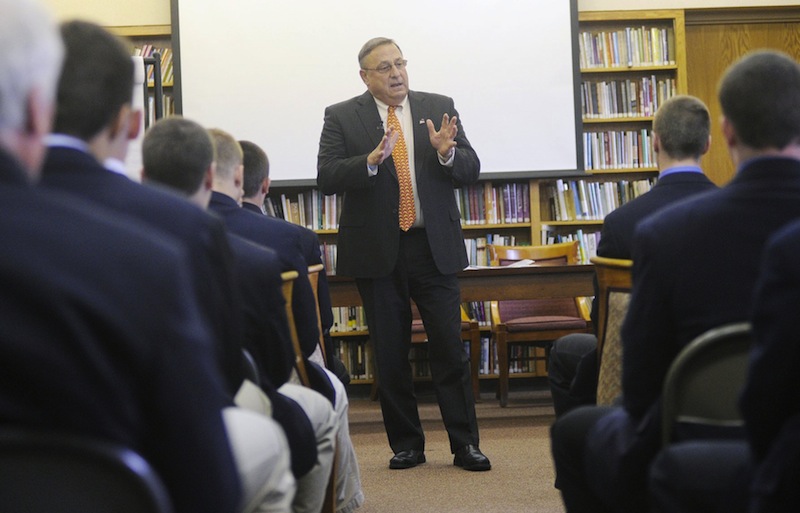AUGUSTA – The LePage administration is proposing a $530,000 school voucher program for low-income students to pay some of the transportation, tuition and residential costs of non-religious private schools or public schools outside the districts where they live.
The program was included in materials that officials distributed Monday at a briefing for the Legislature’s Education Committee on education spending in the governor’s proposed $6.2 billion budget for the next two years. But it was not discussed during the briefing, and it was unclear how the Department of Education would allocate the money.
A spokesman, David Connerty-Marin, said no one from the department would be available for comment on the proposal. But some legislators voiced immediate concerns.
“This is a vehicle to implement a voucher program without having an earnest conversation about it,” said Rep. Matthea Daughtry, D-Brunswick, who blasted the proposal and said it should have been introduced as a distinct bill, not in LePage’s budget.
The costs would be paid from the Choice and Opportunity Fund, an existing $530,000 fund that was earmarked for a school that is now one of the state’s first charter schools, the Maine Academy of Natural Sciences at Good Will-Hinckley in Fairfield.
The program would be offered to students who qualify for free and reduced-lunch under federal law, which in Maine is 44 percent of all students – 84,000 out of 189,000.
The head of the state teachers union questioned whether it would be the best use of scarce funds for education.
“There isn’t money for the day-to-day costs of school. There isn’t money for retirement costs. But there is money for new programs that someone has decided take precedence,” said Lois Kilby-Chesley, president of the Maine Education Association. “These are pet projects … the money is just being shifted around.”
Under the budget proposal, the education commissioner “may” reimburse low-income families for:
• Some portion of transportation costs for students who transfer from one public school district to another. Currently, such transfers need approval through so-called superintendent agreements, or by the state education commissioner.
• Tuition and transportation costs to attend an approved private school or public school outside the student’s district. That would include town academies such as Thornton Academy in Saco and private schools like Waynflete School in Portland, for example, but not religious schools.
• Cost of residential services at a residential public charter school. The only such school in the state is the Maine Academy of Natural Sciences.
Like Kilby-Chesley, Daughtry said financing is a concern. “We have to be very careful where we allocate our funds right now,” she said.
Too often, Daughtry said, legislative sessions bring many ideas that are “bright shiny toys” — educational initiatives that are exciting but lack funding or take money from bread-and-butter needs at the district level.
Rep. Michael McClellan, R-Raymond, agreed. He said he supports voucher programs, but there are budgetary concerns.
McClellan noted that his district already has school choice, so it pays tuition at other schools. “The problem is, we have got great public schools, but we legislators keep piling on (new mandates).”
Twelve states and the District of Columbia have school voucher programs, according to the National Conference of State Legislatures. Of those, four states and Washington, D.C., offer vouchers to low-income students or students from failing schools.
In 1989, Wisconsin’s legislature passed the nation’s first modern school voucher program. In 2011, Indiana created the nation’s first statewide school voucher program for low-income students.
Under current Maine law, a school district that doesn’t have its own schools, or a contract with a nearby district, pays tuition for students to attend public or approved private schools. It was unclear Monday whether the proposed fund could offset those payments.
Other lawmakers agreed that they must discuss the issue.
“For years, I’ve strongly opposed vouchers. I think it weakens the commitment to our public schools,” said Rep. Brian Hubbell, D-Bar Harbor. “At what point are you actually signaling a lack of support for public education?”
Noel K. Gallagher can be contacted at 791-6387 or at:
ngallagher@pressherald.com
Send questions/comments to the editors.




Comments are no longer available on this story